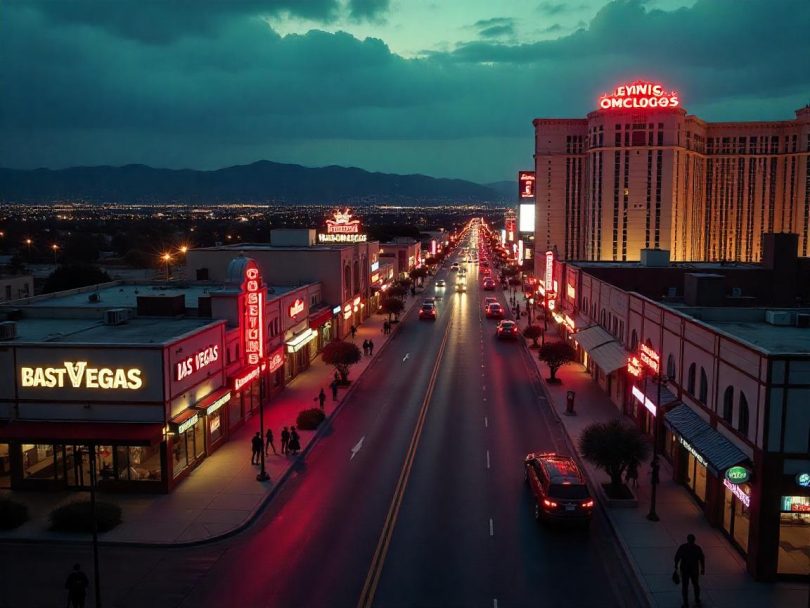Monday, June 9, 2025
Las Vegas, once the unstoppable heartbeat of American entertainment, is now staggering—joining Los Angeles, San Francisco, Washington D.C., and New York City in a brutal decline. The latest data paints a grim picture: the Trump Slump is no longer a whispered concern. It’s a full-blown crisis. Tourism numbers are crashing. Casino profits are being wrecked. Hotel jobs are getting gutted at an alarming pace.
This isn’t just another market hiccup. It’s a seismic shift, and it’s hitting fast and hard. Las Vegas, which once danced in neon glory, is now blinking under pressure. Meanwhile, Los Angeles is losing footfall, San Francisco is watching its hotels go half-empty, Washington D.C. is suffering from thinning tour groups, and New York City is bleeding international traffic. These powerhouse cities are buckling.
What makes this even more shocking is the synchronized collapse across multiple major metros. One would expect Las Vegas to hold the line with its casino cash flow, or New York to hold strong with its global pull. But no. The slump is spreading like wildfire.
The Trump Slump is doing more than just bruising egos—it’s ripping through revenue streams. Tourism boards are scrambling. Hotels are slashing staff. Casinos are falling eerily quiet.
A new report confirms it all, and the findings are deeply unsettling. How bad is it really? Why now? And who’s next?
This isn’t just a downturn. This is a devastating reckoning. And what happens next could change the U.S. travel industry forever.
America’s Casino Cities Face Rough Odds as Travel and Tourism Get Hard Hit in 2025
America’s legendary casino cities are facing a losing streak in 2025. Travel and tourism, the lifeblood of these destinations, have taken a hard hit—and the cracks are beginning to show across Las Vegas, Atlantic City, Reno, Biloxi, Tunica, Lake Charles, New Orleans, Detroit, Black Hawk, and Philadelphia.
Las Vegas, the crown jewel of casino tourism, is seeing a dramatic slowdown. Packed casino floors and glittering lights are dimming under the pressure of fewer flights, rising costs, and global uncertainty. Hotel rooms sit empty as travel demand weakens, and the Strip’s once-pulsing energy feels noticeably slower.
Atlantic City isn’t faring much better. The East Coast casino hub has seen a dip in visitors as inflation curbs spending and entertainment budgets shrink. Its iconic boardwalk and historic casinos like Borgata and Tropicana now face quieter seasons, with tourism getting hard hit.
Reno, known as the “Biggest Little City in the World,” is also showing signs of stress. Casino traffic has dropped, and fewer Californians are making weekend gambling trips. In Biloxi and Tunica, two Mississippi casino cities that once thrived on Gulf Coast and Memphis-area travel, hotels and gaming floors are operating well below capacity.
Meanwhile, Lake Charles and New Orleans in Louisiana are feeling the pain too. As fewer visitors flock to resorts like Golden Nugget or Harrah’s New Orleans, the tourism slump deepens. Detroit’s casino industry, including MGM Grand and MotorCity Casino, faces shrinking foot traffic, and its downtown economy feels the impact.
Even in scenic casino towns like Black Hawk and Central City in Colorado, where travelers used to combine mountain views with gambling getaways, the slowdown is undeniable. Philadelphia, a rising urban gambling hotspot, is now scrambling to recover from sharp tourism drops that have hit its casino revenue hard.
From coast to coast, casino cities are facing a reckoning. Travel is down. Tourism is hard hit. And the once-booming casino sector is suddenly rolling the dice on recovery.
Las Vegas Faces Economic Crossroads as Tourism Slump Guts Casino Jobs and Hotel Revenue
Las Vegas, long celebrated as the mecca of nonstop excitement, is now facing a painful tourism reality. Visitor numbers have dropped sharply. The buzz of casino floors is fading. And behind the curtain of neon lights, the people powering the city—its dealers, hotel workers, and hospitality staff—are feeling the sharp edge of this downturn.
In April 2025, Las Vegas reported a 5.1% year-over-year drop in tourist visits. That decline may appear small, but in a city that lives and breathes on consistent high-volume foot traffic, the impact is severe. Every percentage point lost ripples across hotel corridors, casino pits, and service jobs that depend on steady crowds.
Casino Tables Go Quiet as Layoffs Begin
Some of the Strip’s largest resorts have quietly begun trimming their workforce. Casino dealers—often the frontline ambassadors of Las Vegas nightlife—are being laid off in clusters. With fewer players occupying tables, their positions have become increasingly expendable. Fontainebleau and Resorts World are among the first properties to cut staff in response to the declining traffic.
Thousands of hospitality jobs have been lost over the past year. As demand slumps, casinos are seeking leaner operations. Automation is one of their go-to solutions. More venues are turning to electronic table games and digital betting interfaces, which reduce the need for trained dealers. The charm of human interaction is giving way to LED screens and self-serve terminals.
Economic Strain Spreads Across the Strip
The numbers paint a stark picture. The Las Vegas metro area ended 2024 with an unemployment rate of 5.9%—the highest among all major U.S. metro regions. This isn’t just a local hiccup. It’s a structural problem gripping the city’s core economic driver: tourism.
Travelers are simply not spending the way they used to. Rising airfares, shrinking discretionary budgets, and global economic uncertainties are all taking a toll. International tourism, once a key pillar of Las Vegas’ diverse visitor base, continues to shrink due to lingering geopolitical tensions and costly long-haul flights.
Hotel occupancy dropped 1% overall in April, with downtown hotels experiencing a steeper 2.6% decline. This erosion in guest volume compounds losses for restaurants, entertainment venues, and local attractions that thrive on tourist dollars.
Wages Flatline While Cost of Living Soars
Even those lucky enough to keep their jobs face an uphill battle. In 2024, the average hourly wage for casino dealers in Nevada stood at $19.96. That’s barely above the national average of $19.25. For a state that is globally synonymous with casino culture, this wage stagnation is glaring. Nevada doesn’t even rank among the top five states for dealer pay, highlighting a growing mismatch between brand power and worker compensation.
Meanwhile, Las Vegas’ cost of living continues to climb. Rent, gas, and grocery prices have surged, putting added pressure on workers in an already stressed sector. Fewer benefits, reduced shifts, and limited job security are becoming the norm.
The Dealer Pipeline Dries Up
The fallout extends to training institutions. Once booming with hopefuls ready to learn the ropes of blackjack, poker, and roulette dealing, dealer schools are now seeing enrollment nosedive. Many who would once relocate to Las Vegas in search of quick career starts are reconsidering. The opportunity promise is dimming. The dream of quick tips and high-stakes tables is now shadowed by uncertainty.
Without a fresh talent pipeline, even a future rebound could be hindered. The infrastructure of skill development is faltering just as demand for adaptability rises.
Industry Adapts, But at What Cost?
Casino operators are reacting—but not always in ways that safeguard livelihoods. Budget tightening is rampant. Shareholder reports show weakened earnings across several properties, and cost-cutting is the prevailing strategy. Capital expenditures are shifting toward automation and digital engagement. Unfortunately, that often means less human capital and more machines.
Some properties are opting to scale back live entertainment or reduce gaming floor hours. These subtle shifts further discourage extended visitor stays and lower ancillary spending on food, shows, and nightlife.
What This Means for the Future of Las Vegas
The Las Vegas tourism ecosystem is at a tipping point. The convergence of economic pressure, automation, and waning visitor demand could trigger long-term structural changes. The danger isn’t just in job losses—it’s in eroding the unique human experience that made the city iconic.
The Strip, once a symbol of limitless energy, now reflects something more sobering: vulnerability. Without decisive strategic shifts, including improved wages, targeted tourism incentives, and greater international outreach, the industry may struggle to rebound fully.
Travel authorities, city planners, and hospitality leaders must act swiftly. Investment in infrastructure, diversified tourism products, and fair employment practices are no longer optional—they’re essential for survival.
The world is watching what Las Vegas does next. Will it reinvent itself again, as it has many times before? Or will it fade into a high-tech but soulless shell of its former self?
For now, the cards are still in the air.











